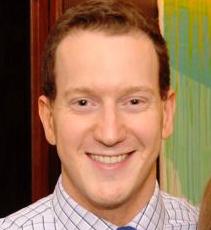
|
|
of the Month
This month we're excited to introduce you to a brand new Success Partner,
Dr. Dana Chidekel. Dr.Chidekel is a board certified Pediatric Neuropsychologist, with a successful practice in Tarzana. She helps both children and adults referred to her due to a variety of academic, behavioral and interpersonal problems. Dr.Chidekel's background is as diverse as it is successful: in addition to serving as a consultant for schools, she is also a published author, having co-written
ADHD as a Model of Brain-Behavior Relationships
, published in 2013 by Springer. She has gone on to co-author another book and has contributed many articles for prestigious peer-reviewed journals in her field. Dr.Chidekel has also been a guest on the Today Show and was featured in a PBS Special called
Great Parents, Great Kids with Dr. Dana Chidekel.
She is co-founder of
Theory in Practice, Inc,
an educational company with the mission to provide clinicians, parents and educators a clear and practical understanding of the relationship between brain development and behavior in everyday life. For more information, visit her website
or call at
818-705-4305.
|
|
Looking For A Student
Community Service Opportunity?
Meet Rickey Smith, social entrepreneur and owner of the sustainable food business Urban Green. He's started a community education venture called the Urban Green Kids Row program, creating opportunities for kids from diverse backgrounds to participate in many activities related to food sustainability, from planting seeds to learning about how organic food is grown and harvested. For more info on a terrific
community service and volunteering opportunity for kids,
email
Rickey,
or call (800) 200 3320.
|
|
Check out Our YouTube Video!
|
|
How Academic Success Can Support You
At
Academic Success
we take great pride in finding the right coach to support the unique needs of each student we help. Please check out the areas where we work on our
web site
and let us know how we can support you.
|
 |
|
Looking for a College Counselor or Ed Therapist?
|
|
We work and partner with excellent Educational Therapists and College Counselors throughout the L.A. area. Give us a call and we can recommend the right fit for your child.
310-823-4398
|
|
| |
|
It should go without saying that teachers need to be  equipping our kids with the ability to solve problems. equipping our kids with the ability to solve problems.
That said, in an educational landscape centered around high test scores and vocational training, problem-solving skills can get lost in the shuffle.
In the age of Google, simply imparting information has ceased to be an effective mode of teaching. And the results are in:
our kids lag behind the rest of the world in STEM performance. There is a growing consensus that one of the primary reasons is the lack of a 'problem-solving' approach in our classrooms.
In many of our schools, teachers are still delivering the 'solution method', where kids are made to watch the teacher solve a problem and then are expected to repeat the process.
As a result, our kids are not learning what might be the most important skill they'll take with them into an increasingly high-skill labor market: the ability to solve problems through innovation and critical thinking.
In this month's issue, we'll shine a light on problem-solving in the classroom and how its effectiveness reaches across all subjects.
At
Academic Success, we strive to equip both students and parents with the latest information to help them move confidently into the world of today and the future.
Please call with any questions at (310) 823 4398 or
All the best,
The Academic Success Team
"If you get stuck, get away from your desk. Take a walk, take a bath, go to sleep, make a pie, draw, listen to music, meditate, exercise; whatever you do, don't just stick there scowling at the problem. But don't make telephone calls or go to a party; if you do, other people's words will pour in where your lost words should be. Open a gap for them, create a space. Be patient."
- Hilary Mantel
|
| 
|
If there was ever a real-world example that demonstrates  the value of teaching problem-solving, this piece is it. Although the quantitative lecture in this story takes place in college, it will seem all too familiar to math students who only have access to "solution method" teaching. the value of teaching problem-solving, this piece is it. Although the quantitative lecture in this story takes place in college, it will seem all too familiar to math students who only have access to "solution method" teaching.
 The statistic is astonishing: as many as 60% of students who intend to study a STEM subject in college end up transferring out of that subject. As unbelievable as that is, this article posits a simple cause: students lack the requisite problem-solving skills to be able to take on the far greater challenges that college presents. The statistic is astonishing: as many as 60% of students who intend to study a STEM subject in college end up transferring out of that subject. As unbelievable as that is, this article posits a simple cause: students lack the requisite problem-solving skills to be able to take on the far greater challenges that college presents.
Standardized Testing
A Barrier To Innovation
Is there a harder profession than teaching? On the one  hand, teachers have to prepare their students for frequent, high-stakes tests; on the other, they are supposed to be encouraging independent thinking and innovation. This article takes a broad perspective to the problem and finds that standardized testing may be the biggest constraint for teachers when it comes to teaching problem-solving in the classroom. hand, teachers have to prepare their students for frequent, high-stakes tests; on the other, they are supposed to be encouraging independent thinking and innovation. This article takes a broad perspective to the problem and finds that standardized testing may be the biggest constraint for teachers when it comes to teaching problem-solving in the classroom.
Building The Problem-Solving Classroom
 It's one thing to demand the teaching of problem-solving. But how do teachers for whom it may not be intuitive make the transition? This insightful piece has some tremendous suggestions to kickstart every classroom toward greater creativity and innovation. It's one thing to demand the teaching of problem-solving. But how do teachers for whom it may not be intuitive make the transition? This insightful piece has some tremendous suggestions to kickstart every classroom toward greater creativity and innovation.
A School
Without
Short Cuts
If parents and students want teachers to teach more  problem-solving, their schools need to get behind it. This Washington Post feature tells the story of a school that drew a remarkable line in the sand to develop problem-solving skills in its students. The only hitch? Some parents were not amused. problem-solving, their schools need to get behind it. This Washington Post feature tells the story of a school that drew a remarkable line in the sand to develop problem-solving skills in its students. The only hitch? Some parents were not amused.
|
| 
|
Make Your Problems
Emotionally Neutral
By now it's been established that critical thinking,
 creativity and innovation are key elements in solving problems.
But that doesn't necessarily help students if they feel unsustainable levels of stress and fear when confronted with problems they must solve during study time.
One of the most transformational steps a student can take in tackling problems is to
make them emotionally neutral.
But what does that mean?
The more you can step back from a problem, take a breath and let go of panic, the easier it will be to consider all the options in solving it.
The next time you face what seems to be a daunting problem, take time to fully relax before beginning the process of finding a solution.
Clear your mind and remind yourself that there is definitely a solution- it's just a matter of finding it.
Ask yourself what you find interesting about this problem. Take time to write down every idea that enters your mind, no matter how crazy or illogical it seems.
If panic wants to return, or the desire to run, breathe deeply and gently encourage yourself to be patient. Imagine you have a lifetime to solve this problem and open your mind to every option, giving everything due consideration.
The greatest thinkers have one thing in common: they give themselves time for their mind to work and they take feelings out of the equation, which allows them to be calm and methodical. If it works for them, it will work for you.
|
| 
|
Coach Profile of The Month
 This month we're delighted to introduce you to one of the newer members of the Academic Success team, Ben Kawaller. Ben hails from Brooklyn, New York and holds a BA in sociology from Harvard University. He also attended New York's Bank Street College of Education, where he studied childhood education before pursuing a career in writing. This month we're delighted to introduce you to one of the newer members of the Academic Success team, Ben Kawaller. Ben hails from Brooklyn, New York and holds a BA in sociology from Harvard University. He also attended New York's Bank Street College of Education, where he studied childhood education before pursuing a career in writing.
Ben brings both academic rigor and personal investment to his sessions. He believes that students' emotional investment in their work is of fundamental importance to their academic success, and he is committed to creating a coaching environment that is joyful, interactive, and meaningful.
Since moving to LA, Ben has kowtowed to this town's relentless athleticism and now plays tennis and kickball in his free time. Ben is also a lifelong theater enthusiast, a comedy fan, and a political junkie. His television pilots have received recognition from multiple competitions and festivals, and he looks forward to one day writing for television professionally.
|
:
We consider it a privilege and an honor to support students and their families throughout the Los Angeles area. Please call us at any time; we welcome your thoughts and input. We are available at 310-823-4398.
Sincerely,
Jamie Altshule
Academic Success, Inc.
|
|
|